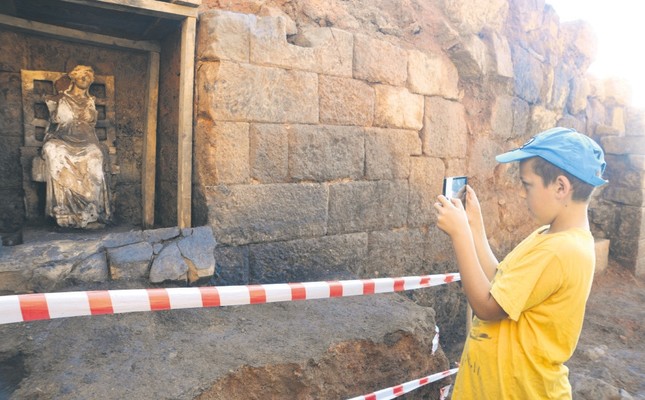Cybele, a goddess revered by ancient civilizations (ΔΕΝ ΛΕΝΕ ΟΙ ΚΟΛΟΤΟΥΡΚΟΙ ΑΡΧΑΙΟΕΛΛΗΝΙΚΟ ΑΛΛΑ ΑΠΛΑ ΟΤΙ ΔΗΜΙΟΥΡΓΗΘΗΚΕ ΑΠΟ ΕΝΑΝ ΑΡΧΑΙΟ ΠΟΛΙΤΙΣΜΟ ΠΡΙΝ 2100 ΧΡΟΝΙΑ) in Turkey, has made a striking comeback in the country as a newly unearthed statue dedicated to her has attracted large crowds.
Local
authorities said some 10,000 people visited the Kurul Citadel in the
Black Sea city of Ordu after the 2,100-year-old statue was discovered
during excavations there.
Culture
tourism or visits to archeological sites, especially those predating
Turkish (Ottoman, Seljuk) rule is not very popular in the country, and
thus, the record number of visitors has both surprised and pleased local
authorities. The tourist numbers might well increase in the future as
the excavations in Ordu are the first of their kind in the eastern part
of the Black Sea, that, like the rest of Turkey, has hosted a diverse
array of civilizations throughout history.
Cybele,
an Anatolian mother goddess, is the symbol of prosperity, with her
pregnant belly seated on her throne. In Anatolian mythology she was the
personification of earth. In Greek mythology, in which she was equated
to Earth-goddess Gaia, Cybele was mostly associated with fertility,
mountains, town and city walls, as well as wild animals such as lions.
The
200-kilogram heavy and 110-centimeter tall statue was discovered seated
on a pedestal in the form of a throne in the ancient citadel some 13
kilometers from central Ordu. Visitors take a 300-step stairway to reach
the excavation site.
Ordu
Mayor Enver Yılmaz said on his social media account that he was pleased
that fellow residents of the Black Sea region are interested in seeing
the statue and said earmarking a larger budget for excavation at the
citadel compared to previous years has apparently paid off.
The
ancient artifact was unearthed in excavations launched by a team of 25
archeologists led by the head of the Department of Archeology at Gazi
University, Professor Süleyman Yücel Şenyurt. "According to our
research, the statue remained intact after the walls of the entrance of
the fortress of Kurul collapsed during an invasion by Roman soldiers.
This statue has also shown us that the fortress of Kurul in Ordu was a
very important settlement [in ancient times]," Professor Şenyurt said.
http://www.dailysabah.com/nation/2016/09/16/statue-of-ancient-goddess-draws-thousands-to-black-sea-city
O Τράβις Μπάρκερ τρολάρει την Κόρτνεϊ Καρντάσιαν στα γενέθλιά της με μια
φωτογραφία της στην τουαλέτα Η ανάρτηση του μουσικού για τα 45α γενέθλια
της συζύγου της δίχασε τους σχολιαστές στην πλατφόρμα
-
Με ένα συγκινητικό μήνυμα Instagram αλλά και μία κάπως... ανάρμοστη
φωτογραφία ευχήθηκε «χρόνια πολλά» στη σύζυγό του Κόρτνεϊ Καρντάσιαν για τα
45α γε...
Πριν από 3 δευτερόλεπτα












.webp)
































Δεν υπάρχουν σχόλια:
Δημοσίευση σχολίου